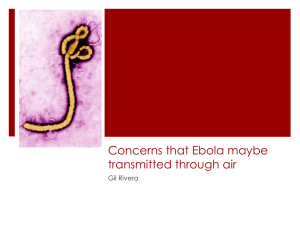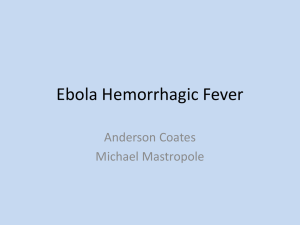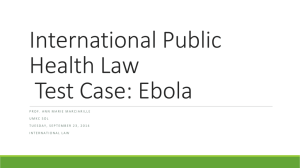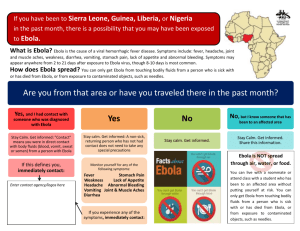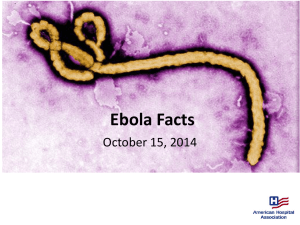Winter edition of the Humanities Herald
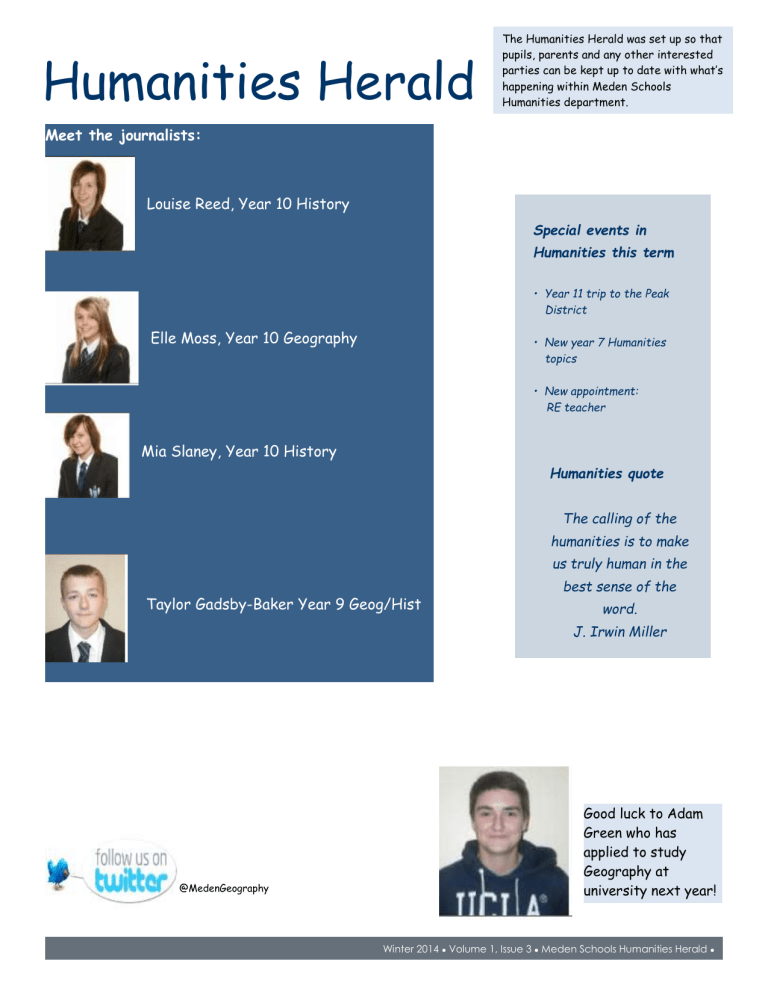
Humanities Herald
Meet the journalists:
Louise Reed, Year 10 History
Elle Moss, Year 10 Geography
Mia Slaney, Year 10 History
Taylor Gadsby-Baker Year 9 Geog/Hist
The Humanities Herald was set up so that pupils, parents and any other interested parties can be kept up to date with what’s happening within Meden Schools
Humanities department.
Special events in
Humanities this term
• Year 11 trip to the Peak
District
• New year 7 Humanities topics
• New appointment:
RE teacher
Humanities quote
The calling of the humanities is to make us truly human in the best sense of the word.
J. Irwin Miller
@MedenGeography
Good luck to Adam
Green who has applied to study
Geography at university next year!
Winter 2014
●
Volume 1, Issue 3
●
Meden Schools Humanities Herald
●
Ebola outbreaks and the distribution
Ebola, previously known as Ebola hemorrhagic fever, is a rare and deadly disease caused by infection with one of the Ebola virus strains.
Ebola can cause disease in humans and nonhuman primates (monkeys, gorillas, and chimpanzees).
Ebola viruses are found in several
African countries. Ebola was first discovered in 1976 near the Ebola
River in what is now the Democratic
Republic of the Congo. Since then, outbreaks have appeared sporadically in Africa.
The natural reservoir host of Ebola virus remains unknown. However, on the basis of evidence and the nature of similar viruses, researchers believe that the virus is animal-borne and that bats are the most likely reservoir. Four of the five virus strains occur in an animal host native to Africa.
The Ebola virus outbreak has infected
14,388 people and caused 5,168 deaths in West Africa since March. In recent weeks, the United States and
Spain have reported their first imported cases, adding to international tensions about how to contain the virus. With no proven treatment, the World Health
Organization (WHO) is scrambling to stop the disease that has had more cases and deaths than all previous
Ebola outbreaks combined.
A map to show the distribution of Ebola
Three West African countries are battling the outbreak—Liberia, Guinea, Sierra Leone. Senegal and
Nigeria's outbreaks were announced on October 17th and 19th. The first case occurred in Guinea in early
December 2013, but scientists didn’t identify Ebola as the culprit until March. The virus, which has similar symptoms to cholera and malaria, evaded health officials until one doctor noticed that many patients experienced hiccups—a distinct sign of Ebola. The four months it went undetected gave it time to spread in
Guinea. A week-by-week breakdown shows the disease ramping up in mid-August.
The distribution of Ebola in Africa is very dense in the west of Africa (shown on the map), where it started in
Guinea it has spread rapidly to Sierra Leone and
Liberia. So far only surrounding countries in Africa have contracted the disease and a case in Spain and
Texas which have been resolved are there.
Many charities are trying to raise money to find a cure to the disease and stop the distribution of Ebola increasing.
Germany’s fall and the rise of the infamous Hitler
This year, the year 10 GCSE students are studying
Germany in the years 1919-1945: the fall of Germany after the First World War, how the notorious Adolf
Hitler came to power returning Germany to its former glory, then how the country fell once again after the loss of the Second World War.
The course began with the students gaining some background information of WW1- contrary to what many people believe, Germany did not start the War.
However, upon their surrender in November, 1918, they were made to sign a peace treaty, which stated that Germany were to take full blame for the events of the War. After that, leaders of the allied countries (America, England and France) made what is known as the Treaty of Versailles; it was a set of terms to which Germany had to agree to if they wished to surrender. A few points included in the treaty: Germany had to become a Republic (their leader, Kaiser Wilhelm, fled the country and the new
German government became known as the Weimar
Republic), Germany was made to pay $6.6billion to
France (due to damage from bombs), the Weimar
Republic were only allowed 100,000 soldiers and a lot of German land was lost.
The signing of this treaty earned the new government the nickname, “November Criminals”, because the
German people felt they’d been betrayed. The huge amount to be paid to France meant many German people fell into poverty, plus the huge reduction in soldiers meant many men lost their jobs. During these unhappy times, there were numerous new political parties arising- for example, in 1920, a group of anticommunists, lead the Kapp Putsch (a rebellion against the Weimar Republic). They over-threw the German government for 4 days, by storming Berlin, however their revolution failed because the majority of
German workers went on strike.
In addition, in 1923, the Weimar Republic stopped paying their reparations to France- they simply couldn’t afford to carry on. As a result, French soldiers took control of an area in Germany called the
Ruhr; it was Germany’s main source of income and was filled with coal mines and factories. With the French in charge, the workers’ wages lowered dramatically, so the government told everybody to go on strike. This decision meant Germany had no income from the Ruhr, at all.
Above: the prices of a loaf of bread. Right: A German woman using bank notes to fuel her fire; it was cheaper than buying coal or wood.
The government’s solution: print off more money.
Unfortunately, this lead to a problem known as hyperinflation- where so much money is printed off that it becomes worthless. This issue added to the already crippling poverty of the country. Eventually, Chancellor
Stresemann called off the strikes in the Ruhr and agreed to continue paying France if Germany could have the Ruhr back. Germany regained its industrial land and the profits that came from it; Stresemann ended hyperinflation by creating a new currency: the Rentenmark. A large part of the course focuses on Stresemann and how he helped deal with the problems Germany was facing.
The next section of the course: Adolf Hitler. The students have been watching clips about Hitler’s early life. Did you know, in 1907, Hitler was rejected from his dream art college by a Jew? He spent his next few years living on the streets of Vienna, whilst finding any work he could. In 1913,
Hitler moved to Germany, in order to escape the War which was brewing in Austria, however in 1914, he volunteered to join the army. He worked as a messenger, earning an Iron
Cross award for his bravery; in 1918, when Germany surrendered, Hitler was in hospital, temporarily blinded.
Upon hearing the news, he was enraged- and blamed the
Jewish members of the German armies and government.
After the War, Hitler got a job as a spy- he had to watch new political parties to ensure they were no threat to the
Weimar Republic. However, in 1919, Hitler joined the Rightwing ‘German Workers’ party and by 1921, had changed its name to the ‘Nationalist Socialist German Workers’ party… or the Nazi party for short. By 1923, Hitler had rallied a lot of support by promising to return Germany to its former glory. He demanded many positive things: that the Treaty of Versailles be destroyed, that businessmen share their profits with their workers, that pensions were raised.
Would you have voted for a man promising such beneficial change?
100 years on…….
We all know about the Great War: trenches, bullets and bayonets. Or do we?
The First World War began with an assassination, a rivalry between nations, resulting in worldwide devastation.
Starting in 1914, this cataclysmic event tore sons from mothers, husbands from wives and brothers from siblings. War was present, rations were set, and death haunted every nation. Fighting day and night for 4 long years, the people of
Britain waited for their sudden victory, a victory that wasn’t so sudden after all. Despite the delay, Britain received
news of Germanys surrender.
4 years on- 11th November in the 11th minute of the 11 th hour. Treaties were signed, conditions were set, and countries recovered- all but Germany. Germany remained unsuccessful, and for the following years, led down a long path of desperation and failure. But Britain was
victorious!
Today, 100 years later, Britain still celebrates its success, although to many its still a period of grieving and sorrow for all that they’ve lost. On 11th
November (or the nearest Sunday to it)
Britain commemorates the men who laid down their lives for the victory of their country. Poppy wreaths are laid, medals are displayed, and the memory of those lost live on. Brave soldiers gave their tomorrow for our today, and those present vows to never forget the sacrifice soldiers made for our future.
My first term of GCSE Geography
In my first term of GCSE
Geography I have learned about
push and pull factors, favelas and slums and the Caatinga region in the
North-East of Brazil.
We started learning about favelas in
Brazil and how google made Brazil look like a poor country by cutting out a popular tourist attractions and replacing it with favelas (in google earth).
The favelas are a dangerous and unsafe place to live but they’re still better then living in the Caatinga region, where rain is rare and life is hard this led to push and pull factors pushing you from the countryside and pulling you to the city.
Push and pull factors
Pull factors are things that attract you to a town or city and push factors are things that you don’t like about a place that make you want to move away.
The diagram above shows you push and pull factors in poorer countries.
Can you think of any that would apply in rich countries like ours?

